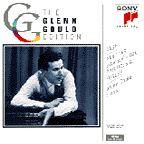“Music is the effort we make to explain to ourselves how our brains work. We listen to Bach transfixed because this is listening to a human mind.”
Lewis Thomas, The Medusa and the Snail (1979)
Desert Island Discs is the title of long-running radio programme on BBC Radio 4 (see Desert Island Discs). The format is simple: each week a guest is invited to choose the eight records they would take with them to a desert island. The discussion of their choice is a device for them to review their life. They also choose a favourite book (excluding the Bible or other religious work and Shakespeare – these already await the “castaway”) and a luxury which must be inanimate and have no practical use.
Here is my first choice:

Glenn Gould: Partita No. 2 in C Minor BWV 826 by J. S. Bach
I first discovered the pianist Glenn Gould when I began to explore my father’s record collection. I had already been taking piano lessons for several years, but without much genuine interest on my part. My parents wanted me to study the piano, and I simply did as I was told. Eventually however, adolescent boredom, combined with natural curiosity, forced me to investigate my father’s small collection of LPs, and at about the age of 16 I heard Glenn Gould play Bach for the first time.
I remember listening through headphones in a state of stunned surprise as Gould played the Italian Concerto, followed by two of Bach’s Partitas. I couldn’t believe that this wonderfully captivating music, so familiar to me in its Baroque style, had been sitting in my father’s stereo cabinet for a decade or more without me knowing. Although my father had studied voice as a young man at London’s Guildhall School of Music and Drama, by the time I was a teenager he had little spare time and rarely played his records.
From Gould’s performances of Bach, I moved onto his interpretations of some of Beethoven’s best known piano sonatas. Although I knew that his interpretations of Beethoven were not always well received, his rendition of the Pathetique sonata is still my favourite.
If I had to choose just one piece to represent how much I have enjoyed listening to Gould’s playing, it would be Bach’s Partita No. 2 in C Minor, BWV 826. Bach wrote his six Partitas for students to use in learning to play the harpsichord. They are all comprised of six or seven dances, and as the liner notes accompanying the recording state “each [is] prededed by an extensive and elaborate introductory movement”.
Gould plays the introductory movement to Partita No. 2 with such magnificent grandeur and suspense that by the end of its 48 seconds you know that this is the beginning of a great story. It’s as if he was playing the overture to a big Baroque opera arranged and abridged for solo piano, and you cannot help wondering what’s in store and how it will turn out.
Given such a well-defined beginning it’s no surprise to discover that Gould gives the piece the necessary middle and end that feature in all effective story-telling. There is no way to know the details of the plot of course, but the end is so positively resolved that we know the participants in this sensitive tragedy (it’s in C Minor after all) have learnt from their mistakes.
Some of the credit for this stunning recording must also go to Bach of course, but if Bach was the author of the story, I have never heard anyone tell it better than the great Glenn Gould.